|
RUGER
COLLECTING
FOREWORD
In the next several
series of articles I will attempt to provide a general overview
of each of the Ruger Single Action revolvers made from
1953 through 1972. These
guns are known as the “three-screw” model or just “old
models”. I will
also list some of the major types and variations of these guns.
I hope these articles will be interesting for the readers
and especially the beginning Ruger collectors – and hopefully
they will influence some of you to begin to collect Rugers.
I must give credit for much of
my Ruger knowledge to my many collector friends from whom I
have learned so much over the years.
Without them I would not have been able to even attempt
to pen these articles. A
hearty thanks to Rich Machniak, Jim Schafer, Lee Newton, John
Dougan, Mike Stewart, Chad Hiddleson, Don
Findley, John Krukenberg,
Ken Sawyers, Bob Campbell, Allen Daniels, Dale Dalbotten, Carl
Laco, Lee Sundermeier,
Henry Bone, Budd Given, and the host of others that I have
failed to name who
have shared your knowledge with me – and a lot of good Rugers
that you allowed me to purchase!
Also much of my knowledge came from the RCA Journals, Red
Eagle News Exchange (RENE), and the other fine books that are
listed on this web-site as suggested reference materials on
collecting Rugers (see Bill's
article at Collecting Rugers - Part 1).
They are worth their weight in gold when it comes to
building your collection.
There are many advanced Ruger
collectors that could easily add much more to these writings.
However, I did not feel the need to go so deep and into
so many details that it might become confusing and overwhelming
to the beginners. I
think that it is much better for the new collectors to obtain
and read as much research material
as possible on their own.
By reading on your own and then handling examples of
these fine guns you will learn faster and have a much clearer
understanding of these guns and their many variations.
I would appreciate any better
or updated information, additional noted variations, corrections
or just general comments regarding these articles.
I am still learning more about these guns and their
variations every day.
In the following articles you
will see several terms used that are registered
U. S. trademarks of
Sturm, Ruger & Company, Inc.
They are the Sturm, Ruger & Company Eagle Logo,
Single-Six, Lightweight, Bearcat, Super Bearcat, Blackhawk,
Super Blackhawk, Old Army,
and Hawkeye.
  
RUGER
OLD MODEL
“SINGLE-SIX” REVOLVER
PRODUCED
1953 - 1972
GENERAL
OVERVIEW
Sturm, Ruger & Co. introduced its
first single action revolver in June 1953.
It was a six-shot .22 caliber called the
“Single-Six”. Bill
Ruger had recognized that, due to the popularity of the
early 1950’s TV and movie westerns, a “cowboy type” gun
should be desirable to the gun public.
Thus the Single-Six was developed and proved to be a huge
success. Its
introductory price was $57.50.
Less than 100 guns were actually produced in
1953 but in a short time production was firmly established .
About 10,000 guns were produced in 1954 and about 20,000
guns produced 1955,
and production steadily increased thereafter.
The first production guns were roll-marked on
the left side of the cylinder frame “RUGER
.22 CAL. SINGLE-SIX ”.
These guns had a 5-1/2 inch barrel, a steel cylinder
frame, three cylinder frame screws, fixed drift adjustable rear
sight, fluted .22 caliber cylinder ( long rifle, long, or short
), flat cartridge loading gate, small serrated ejector rod
button, alloy Colt-style XR3
black anodized grip frame, and
Black checkered hard rubber grip panels with the
trademark Black Eagle medallions.
These early production guns are known today as
“Flatgates”.
Early on in the Single-Six production, stag and
ivory grip panels with the Ruger Black Eagle logo could be
purchased from the factory for $8.50 and $16.50, respectively.
Varnished Walnut grips later became available around 1955
for $5.00. These
varnished Walnut grips actually became the standard about 1960
with the Black checkered hard rubber grips still available but
costing $1.00 less. The
ivory grips were dropped from the catalogs about 1958 and the
stags were dropped when the grip fame was redesigned in 1962.
The original “flat cartridge loading gate”
was changed to a “contour or round” Colt-style gate in early
1957. These guns are known as “Roundgates”. The 4-5/8 inch and 9-1/2 inch barrel lengths were introduced
around mid-1959. Both
of these barrel lengths turned out to be fairly rare and scarce
when mated with the early style XR3 grip frame.
The standard Single-Six with dual cylinders
(without the “Magnum” marking on the cylinder frame which
will be covered in a separate series on the “Magnum Only”
Single-Sixes) began to appear around 1961 in the 4-5/8, 5-1/2,
and 9-1/2 inch barrel lengths.
Both the .22 caliber cylinder and the .22 Rim Fire Magnum
cylinder were fluted. The
extra cylinder, the .22 Magnum in this case,
had the last three digits of the serial number stamped on
its front face near the cylinder base pin hole.
During 1963 Ruger began
numbering the extra cylinder with an electric pencil
rather than stamping the numbers. Normally you will find both cylinders numbered with the last
three digits of the serial number when the electric pencil
procedure began being used.
Ruger made several changes in their single
action revolvers in 1962/63. Three of the most notable changes were the new redesigned
black anodized grip frame (marked XR3-RED) versus the original
XR3 grip frame, the change to oil filled
Walnut grips versus varnished Walnuts, and an aluminum
alloy ejector rod housing versus the steel housing.
The 6-1/2 inch barrel length was added to the
standard Single-Six line around late 1962/ early 1963.
Thus these gun were available in four barrel lengths (
4-5/8”, 5-1/2”, 6-1/2”, and 9-1/2” ) from about 1962/63
until the end of old model or “three screw “ production in
1972. The 9-1/2”
and 4-5/8” are the most scarce.
The first Single-Sixes came in black and red two
piece boxes that was to become the standard throughout
production of these old model guns.
Through the years, these boxes had various forms of
identification marking its contents on the end of the box but
the basic box remained the same.
The boxes were normally numbered by hand on the front
left hand corner in lead pencil or grease pencil or the right
side in grease pencil on the later guns.
These guns also came inside a cardboard shipping sleeve
or “bookwrap” that had the model stamped on it and the
serial number handwritten in pencil on the side.
Pristine complete packages are very hard to find today
since most people tended to throw away
the box or especially the shipping carton.
Today these complete pristine packages will bring a
premium from the discriminating collector.
The so-called Old Model or the three screw
production ended in 1972 and the New Model Super Single-Six went
into production in 1973 and is still in production today.
  
RUGER
OLD MODEL
“SINGLE-SIX” REVOLVER
SOME OF
THE MAJOR
TYPES AND
VARIATIONS
Single-Six, Standard Revolver:
-
Flat
loading gate or “Flatgate”, single .22 caliber cylinder,
early XR3 marked black anodized grip frame, Black checkered hard rubber grips, 5-1/2” barrel.
-
Contour
loading gate or “Roundgate”, single .22 caliber cylinder
, early XR3 marked black anodized grip frame, Black
checkered hard rubber or varnished Walnut grips, 4-5/8”,
5-1/2”, 9-1/2” barrels.
-
Roundgate,
dual (.22 cal. & .22 Magnum) cylinders, early XR3 marked
black anodized grip frame, Black checkered hard rubber
or varnished Walnut grips, 4-5/8”, 5-1/2” and
9-1/2” barrels.
-
Roundgate,
dual (.22 cal. & .22 Magnum) cylinders , the later
redesigned XR3-RED marked black anodized grip frame, oil
filled Walnut grips, 4-5/8”, 5-1/2”. 6-1/2” and
9-1/2” barrels.
As you can see from the above, you would need to
collect several guns in order to have a representative of each
of these major types and variations listed for this revolver.
It is a challenge to find these in top collectable
condition since these guns were considered “working guns”
and most were used extensively.
There are numerous additional variations of the
Single-Six that the collector can move into.
For instance, there are four distinct variations of the
“Flatgate” alone.
I will not attempt
to try and cover them and other variations here.
This will require considerable study by the beginning
collector to understand the make up of these guns and what to
look for.
These additional variations include such things
as: different ejector rod housings, different ejector rod
buttons, different front sights, different grip medallions,
different mixtures of old and new improved parts or
“transition guns”, different
packaging or boxes, different serial number sizes, or just
serial numbers themselves, etc., etc.
As you can see, when it comes to collecting
Rugers you can go in several directions or as deep into the
variations as you like. That
is one of the reasons Ruger collecting is so much fun, you are
never truly complete, always something else to learn and some
other gun to try and find, always looking to upgrade, etc.
It is truly a challenging and satisfying hobby.
My
next article in the series will cover the Single-Six
“Lightweight” .22 caliber revolver.
Bill
Hamm
Read more about Bill on the
"About Us" page.
  
Got something to say about this article? Want to agree (or
disagree) with it? Click the following link to go to the GUNBlast Feedback Page.
The Ruger Owners
& Collectors Society is an active organization for all Ruger
Owners, Shooters and Collectors. Annual Membership
includes a ROCS Logo Brassard, the latest Digest Magazine and an invitation
to ROCS events. There will be two Digest magazines
published every year. For more information and to apply
for annual membership please visit www.Rugersociety.com on
the web or write to ROCS, P. O. Box 1026, Killen, AL
35645-1026. We welcome you!!
|
|
(Click pictures for a larger version)
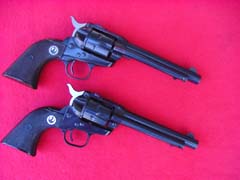
Ruger Single-Six Type One Flatgates #239
& #666
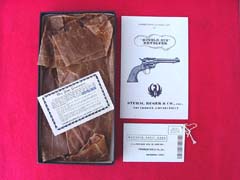
#239's original open box with oil wrap, first
instructions & warranty
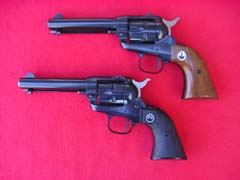
Examples of early Single-Six with XR3 grip frame, 4-5/8"
barrels, and Black rubber and
Walnut grips
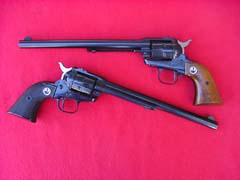
Examples of early Single-Six with XR3 grip frame, 9-1/2"
barrels, and Black rubber and
Walnut grips
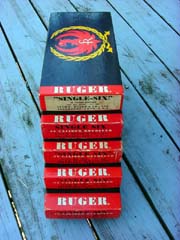
Examples of original factory boxes
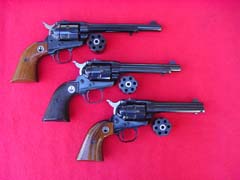
Examples of 4-5/8", 5-1/2" & 6-1/2"
convertibles
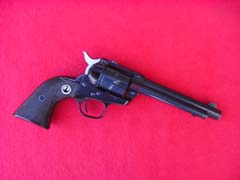
Single-Six type One Flatgate #239
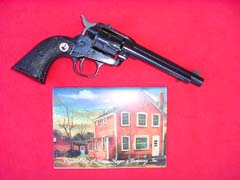
Single-Six Type One Flatgate #666 with Ruger's original
"Red Barn" factory
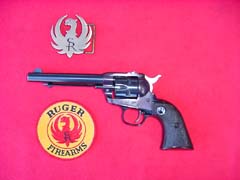
Plum color
5-1/2" with Ruger patch and belt buckle
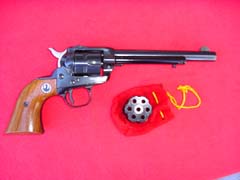
6-1/2" Roundgate convertible with XR3-RED grip
frame
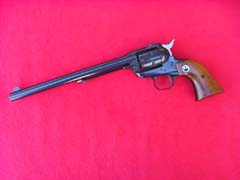
9-1/2" barrel model with XR3 grip frame &
Walnut grips
|
![]()